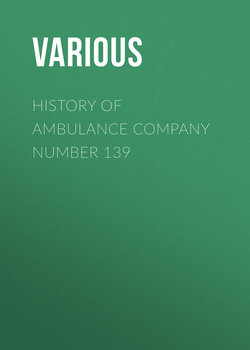Читать книгу History of Ambulance Company Number 139 - Various - Страница 5
DEPARTURE FROM CAMP DONIPHAN
ОглавлениеThe day of May 8th, 1918, dawned bright and fair. The morning was spent in finishing up little odds and ends of work, and in rolling packs. At 1 P. M. "Fall in," the last one at Doniphan, sounded, and soon afterwards the Sanitary Train started its march to the railroad yards. Again it was hot and dusty, just as it had been when the company marched into camp, and it was with a feeling of relief that the troop train came into view. Pullman cars? No, the Sanitary Train couldn't be as fortunate as that, so the men had to be content with chair cars.
With seven months training behind them, the men of Ambulance Company 139 left Camp Doniphan for "Somewhere in France" with great anticipation, feeling that they were ready for any part that they might have to play.
On board the train, which left Doniphan at 3 P. M., the men amused themselves in reading and card games. There were a few details, such as sweeping the cars, kitchen police or serving the meals "de luxe" to the boys, but the old beloved guard detail was not left to the privates. It was graciously wished on the non-coms, who were forced to carry a "45 smoke wagon" on their belts, according to some General Order in the "blue book." We never learned whether they were to keep the boys from getting out or to keep the feminine sex from getting in.
At our first stop, El Reno, Okla., the four ambulance companies, which made up one train, "fell-out" for a little exercise, and after an hour or so of maneuvering, we climbed aboard again to journey nearer the Atlantic. We were by this time consulting time tables, watches and maps to decide over which route we must travel in order to pass through Kansas City, the home of most of the boys in the company. The first night of traveling passed slowly, and as the first tints of dawn were spreading over the eastern sky our train drew into Topeka. Shortly after daybreak the train left the Capitol city of Kansas, and headed down the Kaw Valley towards Kansas City. As the noon hour of May 9th was passing away the train pulled into the big Union Station, where mothers, fathers, wives, brothers, sisters, sweethearts and friends had been waiting for hours, with baskets overflowing with delicious meats, sandwiches, fruits and all the rarest and spiciest that a Mother's effort could put forth.
Again the "blue book" came into play, and we took a little sightseeing trip up Main Street. The bride of a certain Sergeant in the company tried to follow her "hero in hobs" but fell out after the first block. We did an about-face at 12th Street and double-timed back to the folks. After re-entering the coach, we leaned out of the window, pulled the Mother and sweetheart up to us, and for the time being were utterly unconscious of what went on around us or where we were. When the train slowly moved out of the station, we tried to smile as we said "Good-bye," and watched the handkerchiefs still waving when we rounded the corner and were out of sight.
We arrived at St. Louis about 12:30 the next morning, and were switched onto a siding, where we stayed until daybreak, when we continued our journey, crossing Illinois and Indiana. At Huntington, Ind., we again stopped and had setting-up exercises. Upon reaching Peru, Ind., we found Pullman cars awaiting us, and from then on we rode in style. Our next stop was at Salamanca, N. Y., where exercise was again on the program. From there we traveled through some of the most picturesque country of the east.
While on the train a humorous incident occurred. The officers heard from some underground source that "Snowball," our dark-complexioned porter, had been passing "Old Evans" around to the boys in a promiscuous fashion. And at the same time "Snowball" heard in the same way that the officer of the guard was going to make a search of his possessions for this precious "fire-water." The search was made, with Snowball looking on wild-eyed, and the officer detective was about to give it up, when he noticed a string leading out the window, and upon investigating found the poor half-dead soldier (bottled in bond) tied by the neck to the other end of the string.
The last night of riding brought us near to the eastern coast, and soon after daybreak on May 12th the train stopped at Jersey City. We slung our packs and pushed our way through the station to a ferry boat. From this point many of us had our first view of New York and the salt water. After loading on the ferry we were pulled out into the East River, where the boat remained for the greater part of the day. At last it moved on and we landed in Long Island City. Dragging our packs and barrack bags, we marched wearily to a Long Island train. A few hours' ride brought us to Garden City, and truly it was well named, for with its low, well kept hedges, its English gardens and its wild flowers growing everywhere, it looked like a garden city. From Garden City to Camp Mills was a weary hike but we finally reached there, and after eating supper, we crawled under our three O. D.s and slept.
During our five days stay at Camp Mills, some of the men were granted passes to New York City, but we left before all the men had a chance to visit that city of bright lights. The day before we departed we were given the last of our overseas equipment, including the pan-shaped steel helmet.
